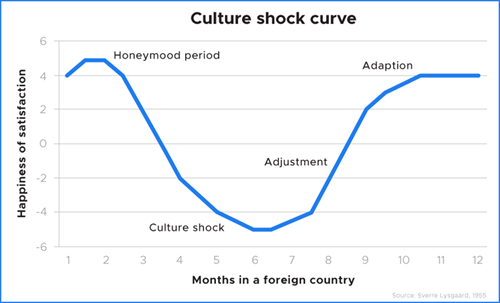What is Culture Shock?
Culture shock is the feeling of disorientation experienced by someone when they are suddenly subjected to an unfamiliar culture and way of life. It can be caused by a range of things, both big and small, such as unfamiliar greetings and hand gestures, strange food, difficult language barriers, getting lost in a new city or making a cultural faux pas because you didn’t know the local custom.
This unfamiliarity can lead to symptoms such as confusion, anxiety, frustration, loneliness, and homesickness. It can even lead to physical symptoms such as insomnia as a result of time zone changes, or colds and stomach bugs due to unfamiliar foods and bacteria.
Culture Shock Stages
Many researchers have written about culture shock and it is widely recognised that there are four different stages to the process – honeymoon, negotiation, adjustment and adaptation. Read on to find out more about each stage.

Source – Sverre Lysgaard, 1955
1. Honeymoon Stage
The Honeymoon Stage is the first stage of culture shock, and it can often last for several weeks or even months. This is the euphoric phase when you’re fascinated by all the exciting and different aspects of your new life – from the sights and smells to the pace of life and cultural habits.
During this phase, you’re quick to identify similarities between the new culture and your own, and you find the locals hospitable and friendly. You may even find things that would be a nuisance back home, such as a traffic jam, amusing and charming in your new location.
However, unfortunately, the honeymoon period must always come to an end.
2. Negotiation Stage
Next is the negotiation stage which is characterised by frustration and anxiety. This usually hits around the three-month mark, although it can be earlier for some individuals. As the excitement gradually disappears you are continually faced with difficulties or uncomfortable situations that may offend or make you feel disconnected.
The simplest of things may set you off. Maybe you can’t remember the way back to your new home because the street signs are confusing, or you can’t fathom how and what to order in a restaurant.
At this point, you also start to miss your friends and family back home and idealise the life you had there. This is often when physical symptoms can appear and you may experience minor health ailments as a result of the transition.
You may not find the locals so friendly anymore and you express feelings of confusion, discontent, sadness, and even anger.
3. Adjustment Stage
Thankfully this phase will come to an end as you begin to move into the adjustment phase, usually at around six to twelve months. This is the stage where life gradually starts to get better and routine sets in.
You begin to get your bearings and become more familiar with the local way of life, food and customs. By this point you may have made a few friends or learnt some of the languages, helping you to adjust and better understand the local culture.
You may still experience some difficulties at this stage, but you’re now able to handle them in a more rational and measured way.
4. Adaptation Stage
Finally, you reach the adaptation stage, sometimes know as the bicultural stage. You now feel comfortable in your new country and better integrated – you have successfully adapted to your new way of life.
You no longer feel isolated and lonely and are used to your new daily activities and friends. While you may never get back to the heightened euphoria you felt during the honeymoon stage, you’ve now gained a strong sense of belonging and finally feel at home in your new environment.
5. Re-entry Shock
It’s also important to note that there can be the fifth stage of this process. Re-entry or reverse culture shock can happen once you return home after living abroad for an extended period.
You may quickly realise that things are very different from when you left, and feel like you no longer belong as your family, friends and even your home town have changed and moved on without you.
You might find yourself saddened that your newly learned customs and tradition are not applicable in your home country, and you have to go through the whole process of adjustment and adaptation all over again!
0 Comments